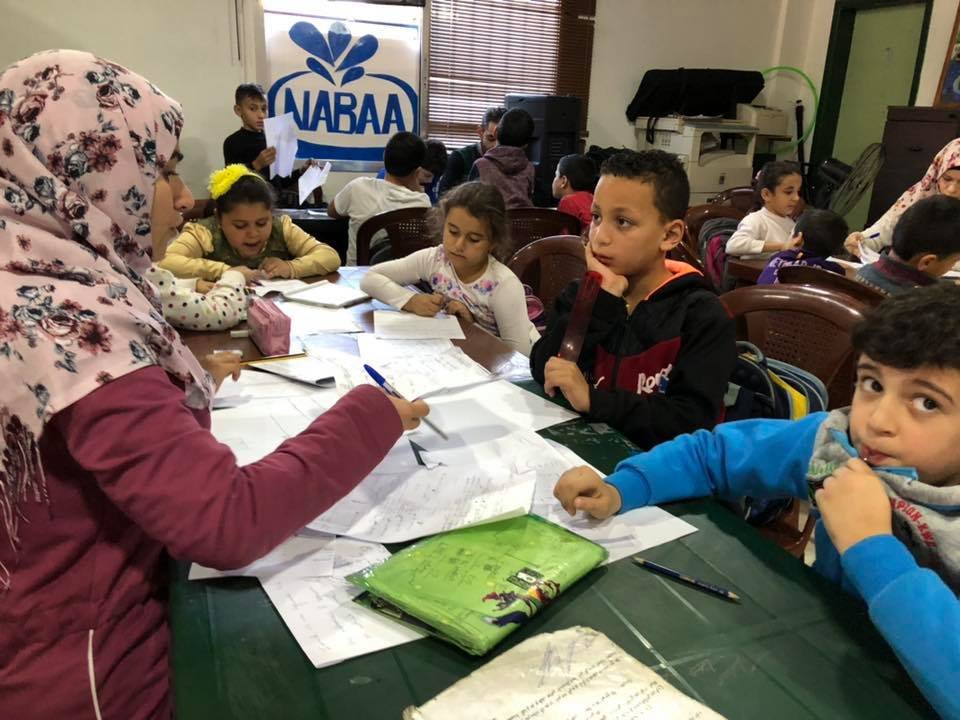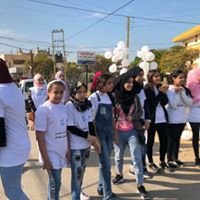By Hiba | Hamzi
Background during and after the implementation of the project; About half of the Syrian and the Palestinian refugees from Syria who have fled to Lebanon are children, and they are facing many risks, including child labor, sexual abuse, neglect and different types of violence in addition to recruitment in armed groups, in a study entitled “Children Spreading and Working in the Streets in Lebanon”: “Characteristics and arguments”, launched by the Ministry of Labor, the International Labor Organization, UNICEF and “Save the Children International”, affected 1510 children living in the street, 73% of whom are Syrian refugee children. “Sex for survival” cases have become disturbing as they aim to provide money and food for families4. With regard to the situation of children, UNHCR noted another important challenge facing refugee children who are not getting education, they are vulnerable to recruitment from armed groups to fight in Syria[1]
Naba’a Achievements; During the last period,
- 333 Children (including children inside and outside schools) were provided equal opportunity in education
- Overall Objective Create educational opportunities for Syrian refugees and vulnerable Palestinian refugee adolescents and enhance students’ well-being and personal development.
- The main activities and intervention are highlighted as the followings;
o Establishing eight new remedial education spaces as part of Naba’a comprehensive education program. Working closely with UNRWA school, these schools hosting 800 children with the main dedicated teachers instructing in the core subjects of Arabic, Math and English. Psychosocial programming is a key component of the students’ days with additional classes in Art, Music and Physical Education combined with a simple Life Skills curriculum. Extracurricular activities including awareness sessions, field trips and social cohesion activities for students, families and community members will round out the program.
o Tapping into Education Specialists nearly all Syrian refugee children have experienced various degrees of trauma. Studies have shown that when children are exposed to the types of traumatic events that many witnessed during the war in Syria, the brain is directly impacted and children will struggle to develop and function normally. The three areas that are most negatively impacted are attention, memory and communication – three skills required to be a successful student. To address these challenges, our Education Specialist have developed diversified
o Life Skills Trainings & Youth-Led Initiatives for Teenagers; Teenagers face many obstacles: they may be too old to reenter formal education, many are already working as unskilled laborers, and many teenage girls are married early to ease the financial burden on their families. Many of these young adults will never return to school. In order to reach this vulnerable demographic, we conduct multiple Life Skills Trainings for Syrian and Palestinian teenagers. The trainings take a youth-to-youth approach and are designed to encourage the development of leadership, community engagement and teamwork skills. Trainees will take initiative by identifying issues affecting their communities and creating their own strategies to respond. This can range from discussion groups to improve social cohesion and communication between Syrian refugees and local Palestinian refugee to helping clean up their communities or bringing art to public spaces.
Case study;
Name: y-r-n
Date of Birth: 6/4/2010
Gender: Female
Nationality: Palestinian
Address: Ein El Helwe – Hay Al Safouri beside Nabaa’ center.
In school: No
She is living with her mother: No
She is living with her father: Yes
Number of brothers: 5 males (15-10-5-4-month) 3 females (14-6-3)
Arrangement of the child between his brothers: FourthAre there any people who are living with the child: StepmotherFather’s career: Collection of Scrap Currently
An overview about the Child's Life:
The girl is living with her father, his third wife and two brothers (2 males and 1 female) Sister and brother from her father knowing that her mother is divorced and she is the first wife whereas the second wife gave birth to two male babies and then he divorced her and he does not communicate with his children from his second wife. While, the third wife is form the Ethiopian nationality as well as he married her 4 years ago and he has two male and female babies from her. The stepmother relies on the eldest daughter to take charge of the house and to follow-up her brothers. Where an improvement in home hygiene was observed before especially after the father carried out some repairs to the house, where he separated his bedroom and his wife from the place where children sleep but it is still without a door. Knowing that, the children's bedroom is the same as the living room. Add to this, all the children are sleeping with each other without taking into consideration to separate males from females. The girl seems quiet, sad and always neglected with dirty clothes and body as well as she spends most of her time outside playing with children on the street.
The economic situation: Badly financial status, where the father is always justifying that there is no available work. But he is enough concerning his belonging to Fateh, which is 400,000 thousand Lebanese Lira which is not enough to provide the necessary needs of the family, especially in the presence of children since they need additional expenses such as milk, diapers and proper food. The family lives in a house owned by them knowing that the home is all about unhealthy room. The ceiling is about two meters high and this leads to feel special pressure in the summer. Health situation: The general situation of the girl is good. She complains of nothing but urination as well as this problem is suffered by her older brother, 14 years old. About a month ago, the girl was exposed to a health problem that led to her unconsciousness. She was taken to the UNRWA clinic and underwent the necessary tests, which should be presented to the pediatrician at the clinic. Her relation with: Mother: There is no relationship with her mother since she left her immediately after birth. Add to this, the second wife took care of her for a year. After her divorce, a neighbor took care of her and now her big sister is taking care of her taking into consideration that the mother does not ask about the girl as well as the girl is not asking about her mother and she doesn’t’ call to see her.
Girl’s relationship with her father:
The father stays outside house most of his time either in his work or with his friends in the street that’s why the relationship between them is normal. He is also uncaring to anything about children or home. The only thing he cares about is his external appearance.
Her Relationship with her brothers:
The girl is connected to her older sister, since she is taking care of her regarding food, drink, clothing, etc.
Main problem: school dropout / introverted/ Neglect in personal hygiene:
The girl does not go to school as well as she does not care about her personal hygiene and stays in the street all day long.
Deprivation of the mother makes the girl with sad gestures and looks scared and mentally unstable as she has the problem of involuntary urination. Add to this, children do not accept her because of its smell and lack of hygiene as her father and her stepmother don’t take care of her and don’t ask about her not which led her to be introverted.
As well as she spend most of her time outside the house without food or drink taking into consideration that playing in the street which expose her to suffer from exploitation.
Collecting information:
- House visits and interviews with her father and her stepmother.
- Community worker and the observation.
Plan of intervention:
• Home visits
• integrating the girl in activities
• Working on returning her back to school
• Presented her to the pediatrician at the center
• Involvement of brothers in structured activities
• Involving the stepmother in the awareness sessions / positive education
• Psychological follow-up of the girl per week
Report:
The girl y-r-n who born in 6/4/2010, a Palestinian girl living with her father and his third wife.
As we mentioned previously in the case study about the girls life, it shows that she needs psychosocial support. Here we are going to mention how to recognize the case and work on it:
Our colleague Manar watched the girl in the street barefooted, shabby and middle-aged, as he brought her to the center in order to o see her identity and clean her face from dust and dirt. Then she shows that she does not wear internal clothes as well as her face has been cleaned and a conversation was conducted with her in order to see where she is living and to take her home and talk with her family.
After realizing where the house is, an intervention was completed by the social worker Souad oweid in order to study the case in details. After many observations and home visits it shows that the girl needs to be cared for, especially in the day where there is only the big sister, which is also in need of attention.
[1]http://www.dailystar.com.lb/News/Middle-East/2013/Aug-06/226496-syrian-refugees-face-recruitment-as-fighters-sexual-abuse-un.ashx#ixzz2cS6RuB70(The Daily Star: Lebanon News: http://www.dailystar.com.lb).
Links:
Project reports on GlobalGiving are posted directly to globalgiving.org by Project Leaders as they are completed, generally every 3-4 months. To protect the integrity of these documents, GlobalGiving does not alter them; therefore you may find some language or formatting issues.
If you donate to this project or have donated to this project, you can receive an email when this project posts a report. You can also subscribe for reports without donating.
Support this important cause by creating a personalized fundraising page.
Start a Fundraiser
